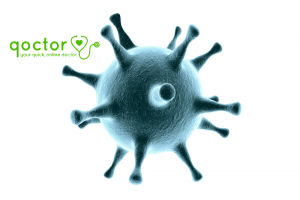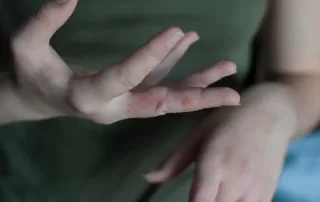Cold Sores
Welcome to Qoctor’s online doctor service which can provide assessment for Cold Sores. Answer some online questions, then book a consultation with an AHPRA-registered doctor. Repeats available (subject to assessment). Please also note, your pharmacist may be able to assist you with over the counter treatments for cold sore.
The consultation fee is $29.99. If a prescription is advised, it can be sent as an eScript to your phone OR electronically to your local pharmacy. Alternatively you can have medication delivered by an Australian partner pharmacy- in this case, the cost of medication is added at the checkout. All treatment and advice is issued subject to your doctor’s assessment.
About Cold Sores
Cold sores are caused by the Herpes Simplex Virus (HSV1), which is spread by skin to skin contact. About 1 in 5 people have cold sores that flare up from time to time. They usually get better without treatment in 7-10 days, though sometimes antiviral creams or tablets may be used to ease symptoms.

FAQs about HSV1 & cold sores
- Cold sores are caused by the Herpes Simplex Virus Type 1, otherwise known as HSV1.
- HSV2 is a similar virus which usually causes genital herpes, but rarely can also cause cold sores around the mouth.
- Cold sores are spread by skin to skin contact, such as kissing someone who has an active cold sore.
- The first infection may not cause any symptoms, but may be triggered later.
- Cold sores can be triggered by stress, fatigue, viral illness, strong UV/sunlight exposure or during menstruation.
- Cold sores are spread by skin to skin contact
- If you have active cold sores you should avoid newborn babies, elderly, or anyone with a weak immune system (e.g on chemotherapy)
- If you have no active cold sores, you’re not usually infectious to others.
- No, usually you do not need any tests to diagnose cold sores.
- The diagnose tends to be obvious, based on history and the appearance of the lesions
- However, if there’s any doubt, your GP can perform a swab and send it to the laboratory for analysis for HSV1.
• People with recurring cold sores occasionally worry that there’s something wrong with their immune system, or that they’re deficient in a vitamin or mineral. But cold sores are very common, and most people who get them are otherwise perfectly well.
• Sometimes tiredness or another viral illness can make you more prone to cold sore flare ups
• If you’re worried, speak to your doctor- they may recommend some general blood tests to check for an underlying cause.
• Usually no particular medication for cold sores is recommended- they naturally get better over 7-10 days.
• There is some general advice when you have active cold sores, such as avoid touching the cold sores; wash hands regularly especially after applying creams or before putting in your contact lenses; and don’t share lip balm or sunscreen.
• Over the counter painkillers like Panadol and Nurofen, or topical anaesthetic gels (e.g Lidocaine) may be helpful for pain/discomfort.
• Antiviral Creams can be bought at your pharmacy- these do not kill the virus but prevent it from multiplying which may reduce symptoms a little.
• Oral antiviral medication may be prescribed to reduce the severity of symptoms, in some suitable cases. This approach may be appropriate if you have severe or frequent cold sores, or a weakened immune system for some reason- speak to your doctor for further advice.
Once you’ve been infected, HSV1 stays in your body. In some people it means cold sores flare up from time to time, in others HSV1 lies dormant, and flares up rarely or not at all.
Health Library- Cold Sores (HSV1)
What is Measles and why is it serious?
Measles- what causes it and why is it serious? spread symptoms complications vaccine What is Measles? Measles is a viral infection, that causes a distinctive rash and fever. It is highly contagious and can lead to serious complications including death. While it’s become much less common in Australia due to routine childhood vaccination, outbreaks still occur from time to time. Sometimes it is brought in to the country by non-immunised people, and it can also arise in communities where vaccination rates are low. How is Measles spread? How do you get Measles? Measles is highly contagious- it's usually spread by the tiny droplets released when an infected person coughs or sneezes. These droplets are inhaled by another person, leading to infection. It can also be spread through direct contact, or by touching a surface that an infected person has contaminated. It can take [...]
Scabies- symptoms, diagnosis & treatment
Scabies- symptoms, diagnosis & treatment What is Scabies? Scabies is a highly contagious skin infestation, caused by a tiny mite, called Sarcoptes scabeii. Due to its small size (2-4mm), it’s difficult to see without magnification. The mites form burrows in the skin where they lay their eggs, leading to further mites and worsening infection. The main symptom of Scabies is an itchy rash, which is often worse at night. It is usually treated by topical lotions, though oral medication is sometimes used. In most cases it’s advised that close contacts within the household or shared accommodation should be treated at the same time. Request a medical certificate How do people get Scabies? Scabies is very contagious and is spread by skin to skin contact with an infected person, or by sharing bedding, towels, clothing or living space. [...]
Bronchiolitis- the facts
Bronchiolitis in kids- the key facts. causes symptoms diagnosis treatment What is Bronchiolitis? Bronchiolitis is an infection of the small airways (bronchioles) in the lungs of young children It is nearly always caused by a virus It usually affects babies under the age of 12 months and is most common during the winter. Though it can take a few weeks to settle, in most cases it’s not serious and gets better by itself. What causes Bronchiolitis? Bronchiolitis is usually caused by a virus known as “RSV”, short for Respiratory Syncitial Virus- it’s possible to get it more than once as there is more than one strain of RSV. Other cold and flu viruses can also cause bronchiolitis. These viruses are very contagious and are easily spread by coughs and sneezes, or by touching objects [...]



